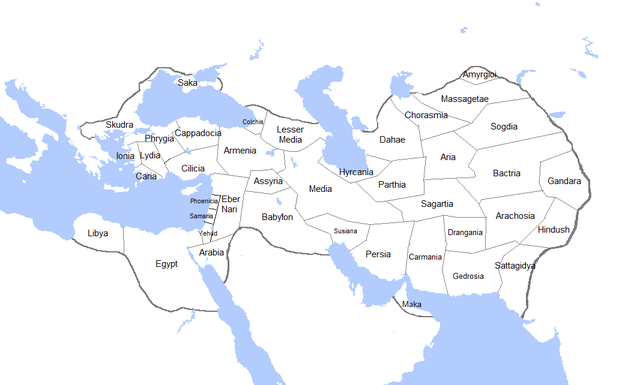Achaemenid Empire
Iranian (Persian) empire (550–330 BC) From Wikipedia, the free encyclopedia
Remove ads
The Achaemenid Empire, or Persian Empire,[3] (550–330 BC) was the first Persian Empire to rule over significant portions of Greater Persia (or Iran). It followed the Median Empire as the second great empire of the Iranian peoples.[4] At the height of its power, the Achaemenid Empire had about 7.5 million square kilometres and was territorially the largest empire of classical antiquity.
The empire was forged by Cyrus the Great and spanned three continents, including parts of Afghanistan and Pakistan; parts of Central Asia, Asia Minor and Thrace; much of the Black Sea coastal regions; Iraq; northern Saudi Arabia, Jordan, Israel, Lebanon and Syria; and all of the significant population centres of ancient Egypt as far west as Libya. The empire was the foe of the Greek city-states during the Greco–Persian wars. It freed the Israelites from their Babylonian captivity and instituted Aramaic as the its official language.
Because of the empire's vast extent and long endurance, Persian influence upon the language, religion, architecture, philosophy, law and government of nations around the world has lasted ever since.
Remove ads
History
The empire began as a tributary state of the Medes but ended up conquering and enlarging them, including Egypt and Asia Minor. Under Xerxes, it came very close to conquering Ancient Greece. The Achaemenids were overthrown by Alexander the Great, who conquered it in 330 BCE.

Kings and leaders

- Teispes of Anshan, son of Achaemenes
- Cyrus I of Anshan, son of Teispes
- Cambyses I of Anshan, son of Cyrus I
- Cyrus II, the Great, son of Cambyses I, ruled c.550-530 BCE (ruler of Anshan c. 559 BCE, conquered Media 550 BCE)
- Cambyses II, son of Cyrus the Great, ruled 529-522 BCE
- Smerdis (Bardiya), alleged son of Cyrus the Great, ruled 522 BCE (possibly a usurper)
- Darius I, the Great, brother-in-law of Smerdis and grandson of Arsames, ruled 521-486 BCE
- Xerxes I, son of Darius I, ruled 485-465 BCE
- Artaxerxes I Longimanus, son of Xerxes I, ruled 465-424 BCE
- Xerxes II, son of Artaxerxes I, ruled 424 BCE
- Sogdianus, half-brother and rival of Xerxes II, ruled 424-423 BCE
- Darius II Nothus, half-brother and rival of Xerxes II, ruled 423-405 BCE
- Artaxerxes II Mnemon, son of Darius II, ruled 404-359 BCE (see also Xenophon)
- Artaxerxes III Ochus, son of Artaxerxes II, ruled 358-338 BCE
- Artaxerxes IV Arses, son of Artaxerxes III, ruled 338-336 BCE
- Darius III Codomannus, great-grandson of Darius II, ruled 336-330 BCE
Remove ads
Related pages
- Persian Empire
- Cyrus the Great, Founder of Achaemenid dynasty and King of Persia
- Darius I, King of Persia
- Sassanid Empire
References
Sources
Further reading
Other websites
Wikiwand - on
Seamless Wikipedia browsing. On steroids.
Remove ads


